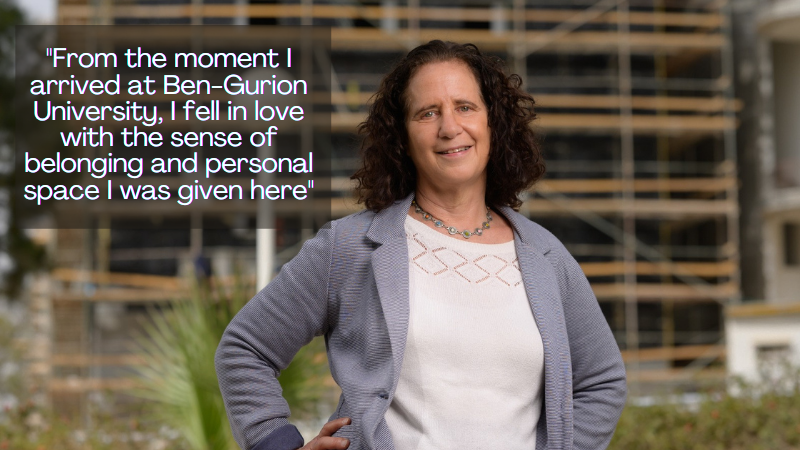.png)
From the March 2021 issue (128) of Aleph Bet Gimmel
Prof. Alva Peled, Head of the Department of Civil and Environmental Engineering, is an expert in sustainable building. She develops advanced construction technologies and materials that are eco-friendly, with the hope that they will replace methods and materials that are presently adversely impacting our world.
After completing her military service, Alva took two years to travel across Europe, a trip that ended in her decision to do something practical with her life and go back to school. Broke from her European adventure she had to look for scholarships. While scholarship hunting, she came across a textile engineering program in Shenkar College of Engineering and Design that she found interesting. After completing four years of hard work at Shenkar she found a job in the industry, but then she realized that it just wasn't the right place for her and decided to return to what she truly enjoyed – academia. “From the moment I arrived at Ben-Gurion University I fell in love with the sense of belonging and personal space I was given here," she says. “I met so many wonderful people here who supported me and helped me along the way."
Prof. Peled's research focuses on high-performance cement-based composites, and particularly textile reinforced concrete (TRC). She develops innovative technologies that use alternative construction materials to significantly reduce concrete's negative environmental impact.
Prof. Peled explains passionately that concrete is the most commonly used material in the world per capita, after water. Its consumption continues to grow alongside global population growth and increasing demands for structures and infrastructures appropriate for this era. Reducing the use of concrete without decreasing a structure's strength and integrity requires thinking outside the box, daring, and lots of creativity – qualities which Prof. Peled undoubtedly has plenty of.
Alongside research done in Germany on the use of carbon fabrics in construction, Prof. Peled is advancing her own breakthroughs. The latest of these is the development of a technology that produces structural elements (such as ceilings and beams) reinforced with carbon fabrics instead of the steel rods used traditionally. According to Prof. Peled, reinforcing the concrete with textile improves the structure's load-bearing capacity over that of traditional structures reinforced with steel. This innovative method was initially employed in the construction of sheds and other structures in Germany, and we can expect to see the expanded use of textile-based components in the construction industry in the future.
Alva Peled's academic path began with a BSc with honors in textile engineering at Shenkar College, an MSc with honors from the Hebrew University, and a PhD in civil engineering from the Technion. After that, she continued to a postdoctoral position at the Center for Advanced Cement-Based Materials at Northwestern University in Illinois. Then, she joined BGU as a faculty member. She has published over 100 articles in international professional journals.

Let's get personal
Question: What's your 'motto'?
Answer: “Don't give up."
Q: Can you elaborate?
A: “During my military service I was placed in a navy training base as the first woman instructor on missile boats. Everyone else there were men, of course. Nowadays there are mostly women in this position, but back then it was very controversial, and I faced a lot of difficulties just because I was a woman. After many unpleasant experiences with some of my commanders who were not happy with this 'groundbreaking' move, I gave up and moved to a different position that at the time was considered more feminine but also less challenging and interesting. After this experience, I decided that this would be the last time I gave up on an opportunity for a challenging and interesting position just because of a hostile male-dominated environment. And that's really how it was."
Q: How do you combine your academic career with family life?
A: “Two things really help me in this respect. First, my spouse and my daughter are very supportive and have stood by me all along the way. And second, it has always been important to me to instill my own needs and ambitions in the family consciousness. My spouse and I share all the family and household chores equally. From the very beginning of our relationship, it was clear that we do everything together. We found a way for both of us to experience raising our daughter, take care of chores, and have meaningful and satisfying careers."
Q: What gives you satisfaction at work?
A: “Everything. I love my research and my work with graduate students and colleagues in Israel and abroad. I love teaching and am enthusiastic when I am given management responsibilities."
Q: Do you have any advice for young women researchers?
A: “Be honest with yourselves. If there is something that you love and feel is right for you, just do it and don't worry about failure or lack of support from those around you."
Q: Something we don't know about you?
A: I have a weakness for orchids and cyclamens. My house and my office are always full of plants and flowers. I really treasure them and spend a lot of my time caring for them."
Q: If you weren't a university researcher, what you do?
A: “Research is something I am really passionate about, and I can't see myself enjoying anything other than research. This is also what has driven me to face and overcome many challenges along the way. If I were pushed to a corner and research was out of the question, I might go back to my early days as a bartender."
Q: A worthy role model?
A: “Shulamit Aloni. She was a strong opinionated woman who fought long and hard for human rights and women's rights, two subjects that are close to my heart."